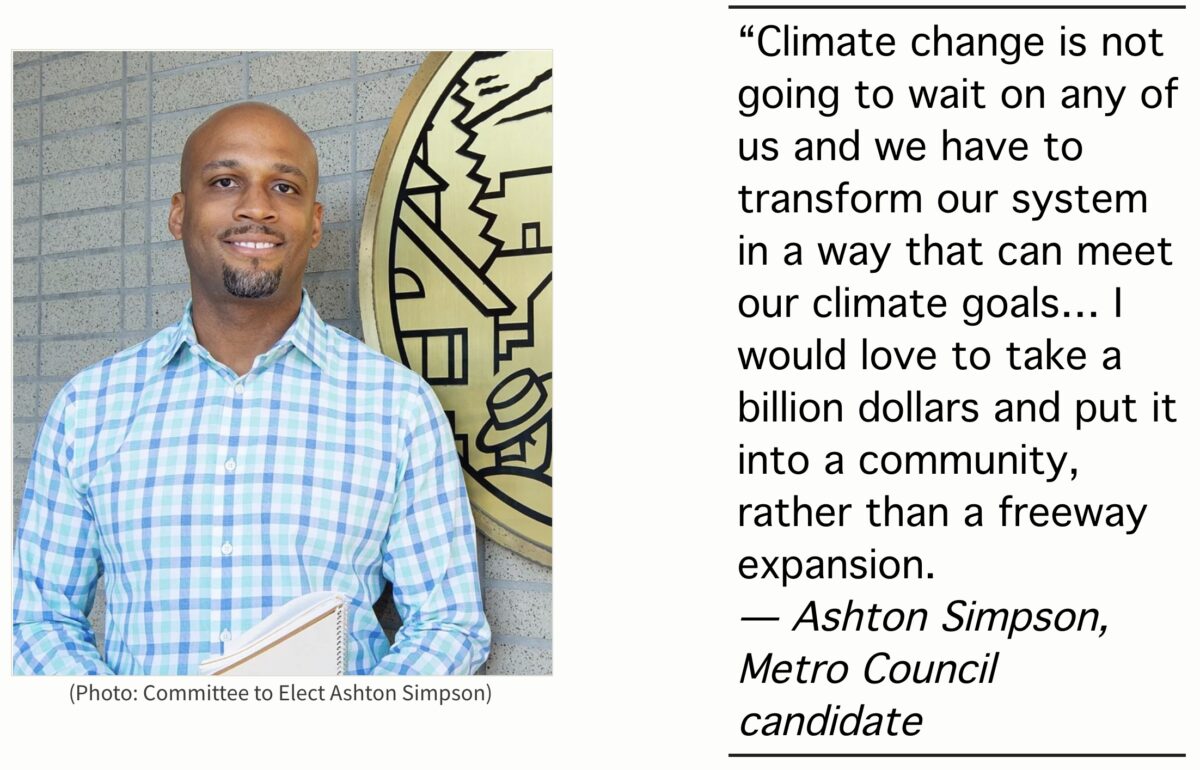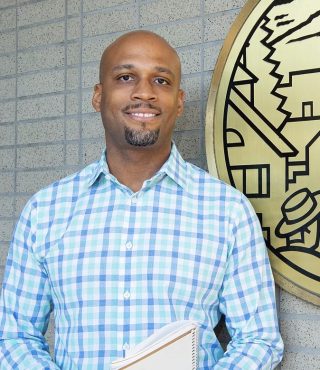“Climate change is not going to wait on any of us and we have to transform our system in a way that can meet our climate goals… I would love to take a billion dollars and put it into a community, rather than a freeway expansion.
— Ashton Simpson, Metro Council candidate
Ashton Simpson wants a seat on Metro Council.
Simpson, the current executive director of nonprofit Oregon Walks and former community organizer and US Air Force veteran, made the announcement Wednesday and already has a campaign website and several very notable endorsements. He’s vying for the District 1 seat that goes from 122nd east to Troutdale, and from the Columbia River south to Happy Valley.
Beyond his work at Oregon Walks, Simpson is very involved in transportation issues in the region. He’s a member of the Interstate Bridge Replacement Community Advisory Group and he sits on the Oregon Department of Transportation Region 1 Advisory Committee on Transportation.
I caught up with him on the phone yesterday. Our chat below has been slightly edited for brevity and clarity.
Jonathan Maus: Why are you running?
Ashton Simpson: I’m running because we have a whole region here that needs to be lifted up. Right now we need leadership that reflects the community. The current census data that we have now says East County is becoming is becoming more and more diverse. I want to make sure that as we are one planning and doing land-use issues that it is going to benefit the people who live here. Meaning, getting them back to work through family-wage, union labor jobs… and also being able to build up their own communities through community benefits agreements and things like that. Also I’m very passionate about our parks and green spaces. So I really want to make sure that we expand those in this region and close some of the gaps that exist in our trail system. And, as you know, always always always as a priority for me is climate and active transportation infrastructure — making sure folks can move around with the most basic needs by walking and rolling.
JM: I assume you heard Metro Councilor Juan Carlos Gonzalez say he would no longer support funding for freeway expansions without a commitment to orphan highways. Is that the kind of position we could expect from as Councilor Simpson?
AS: Absolutely. You know what? Climate change is not going to wait on any of us, and we have to transform our system in a way that can meet our climate goals. But also as Councilor Gonzales points out, I would love to take a billion dollars and put it into a community, rather than a freeway expansion.
JM: A few years ago Metro was forced to shelve a major trail project because people were afraid it would become filled with homeless encampments. I also hear regularly from people who have stopped using our regional paths because they are often blocked by trash and belongings and/or they fear for their safety due to the presence of people living on them. There has to be a way to make this situation better for everyone. Have you thought about this issue and is there anything you could bring to Metro that would help address it?
Advertisement
AS: I have no choice but to think about this and I see it everyday in my community. The campus at 122nd and Siskiyou, down on Marine Drive, which is also a part of our “regional biking highway” as I put it… We have to do better with housing. And from Metro’s point of view, we can definitely work with our jurisdictional partners to make sure that happens because that’s not that’s not something Metro can do on its own… I mean, you can focus on the trails, but then what about the people? And I’m always people-first. And I get it; people want to have access to those green spaces and things like that. Well first of all, let’s take care of the people who are living without shelter. Right? Like let’s do that first, and then let’s talk about closing those gaps. Because until we do that, nobody’s gonna feel safe, or want to ride on those, those paths without that level of level of comfort.
JM: How has your previous experience set you up for this next step?
AS: First of all, it’s all about collaboration. And in each of those roles I’ve had, I had to work with teams and with leaders in the community to find change. So for example 82nd Avenue, that took a lift from the legislature, took a lift from ODOT, from PBOT, and also took a lift from us as community activists and residents in the area. That collaboration piece is what I want to bring to the table working between these jurisdictions in this region and in this city, to make sure that it’s working right for the people.
JM: As you know, Metro doesn’t necessarily get into the business of designing streets, but they do hold a lot of the the budget pursestrings. Looking ahead are you ready to have that big conversation about another transportation funding package?
AS: Top priority. Top priority. I put a lot of work into the last measure. And from being on a local investment team, to really promoting it and getting it out there to the community through various educational events, You know, this time around we’ve got to pass it. Because guess what? Our community was set back to square zero, while other communities, you know, continue to get build-outs. Things are happening slowly. PBOT is doing what they can do with the funds that they have. But at the end of the day, it’s going to take a big lift from a measure like that.
JM: Anything else you want the community to know about you and your campaign?
AS: Absolutely I want them to know that I’m not only going to fight for just all the things I want, I’m going to be specific. I want to talk about protected bike lanes in East Portland and what that looks like. I mean, we got the start of it on Halsey here with a 30 mph speed limit reduction. Now we need some enforcement and some road design. Part of that road design means we have to have separate modes of transportation, or have the modes of transportation separated out so we have safe places for people to walk and bike. I especially want to center in this in this race our seniors, our youth, and people with physical and mental disabilities. Because if we design things with with those folks centered, everybody else will benefit. And that’s that’s how I roll. I’ve learned that from my career in the Air Force to my time working in construction, that has always been the focal point. It’s about making sure folks — the most vulnerable and a disadvantaged — can have that ease of access and a comfortable mobility.
Learn more about Ashton Simpson at AshtonforMetro.com.
— Jonathan Maus: (503) 706-8804, @jonathan_maus on Twitter and jonathan@bikeportland.org
— Get our headlines delivered to your inbox.
— Support this independent community media outlet with a one-time contribution or monthly subscription.



